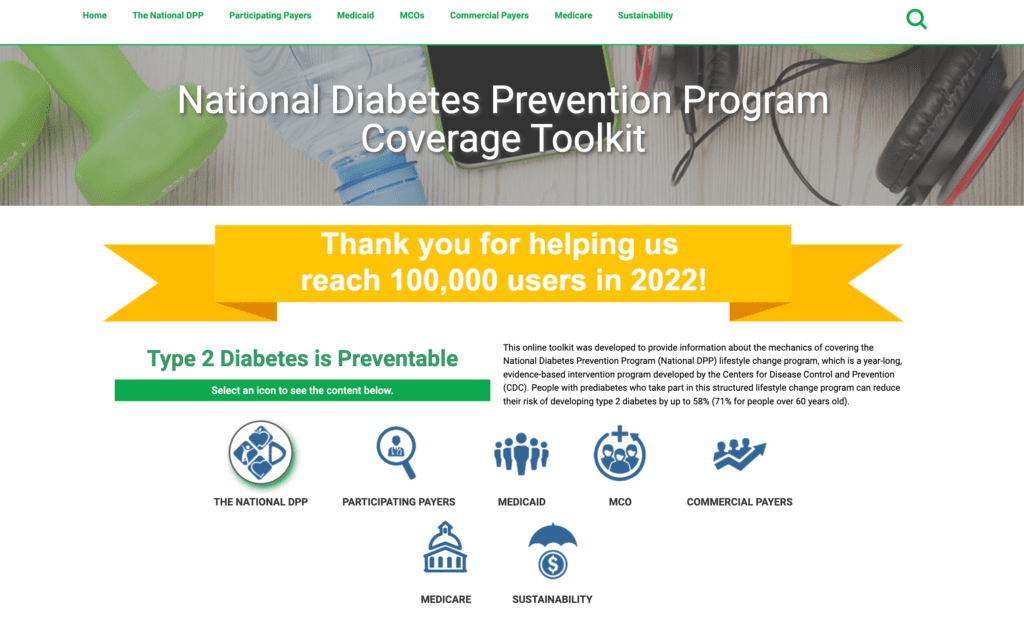By: Wendy Childers, NACDD Diabetes Program

Visit NACDD’s Coverage Toolkit homepage.
NACDD’s Diabetes Program team is thrilled to announce that the National Diabetes Prevention Program (National DPP) Coverage Toolkit has surpassed 100,000 users!
The Coverage Toolkit was launched in June 2017 with support from CDC. The goal of the toolkit is to help public and private payers and purchasers (i.e., employers) as well as those making the case for coverage fully understand the National DPP, navigate the steps needed to cover it, and access detailed information and resources.
The Toolkit is organized according to payer type: Medicaid agencies, Medicaid managed care organizations (MCOs), commercial payers (health plans and employers), and Medicare. It has become a critical and evolving resource for public and private payers and purchasers across the country as well as for diabetes prevention partners including healthcare professionals, community-based organizations, and public health institutions.
Authorizing a new benefit can be a complex process, especially within Medicaid, and the National DPP lifestyle change program* is a unique type of health service in that it is preventive, community-based, and addresses social and behavioral factors in chronic disease prevention.
The Coverage Toolkit provides guidance, resources, and state examples to support each step of establishing and operationalizing coverage, from policy to payment. As described by one user, “I would not be able to have a conversation with our Medicaid office without [the Coverage Toolkit].”
Some of the newest and most visited content on the Coverage Toolkit can be found under the Sustainability tab. The Health Equity and the National DPP section offers guidance on how promoting health equity can support the impact and reach of the lifestyle change program and how the program, itself, can be used as a model and an opportunity to address health-related social needs (HRSN).
The Umbrella Hub Arrangements pages describe novel innovations within healthcare and social services to connect community-based organizations (CBOs) with healthcare payment systems to pursue sustainable reimbursement for programs such as the National DPP.
Users can visit the Cost and Value, the Medicaid Case for Coverage, and Commercial Case for Coverage pages for resources to help public and private payers and purchasers understand the value of covering the National DPP lifestyle change program.
One user described how “the Toolkit provided talking points around program coverage that we will use to engage new employers.” The Evidence page includes links to research studies, peer-reviewed articles, and statistics to support coverage of the National DPP lifestyle change program, while the Participating Payers page captures up-to-date information, to the best of our knowledge, about public and private payers and purchasers currently covering the program.
For more information on the Coverage Toolkit please contact coveragetoolkit@chronicdisease.org.
***
*The National DPP lifestyle change program provides a unique opportunity for individuals to prevent or delay type 2 diabetes through weight loss, increased physical activity, and support from a trained Lifestyle Coach. Research shows that people with prediabetes who take part in this year-long, structured program can cut their risk of developing type 2 diabetes by 58% (71% for people over 60 years old). This is the result of the program helping people lose 5% to 7% of their body weight through healthier eating and 150 minutes of physical activity a week. This program can be offered in-person, online, or through a combination approach. It is founded on the science of the NIH-led Diabetes Prevention Program (DPP) research study and several translation studies that followed. The National DPP is supported through an all-payer model, which includes Medicare, Medicaid, state health plans, commercial health plans, and employers.
